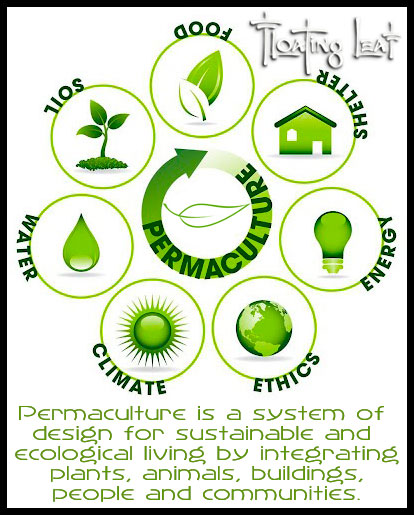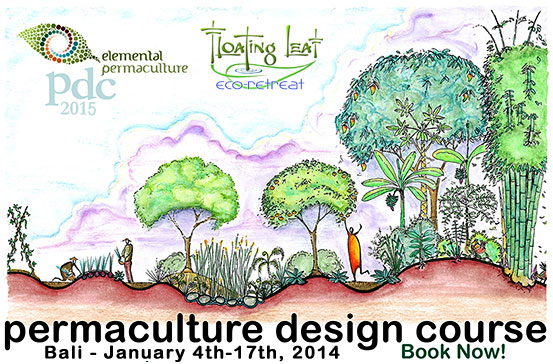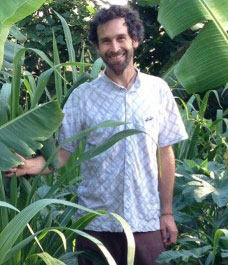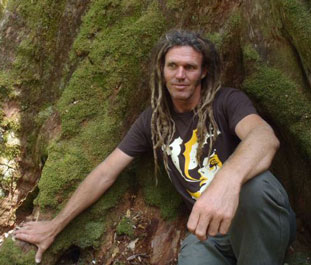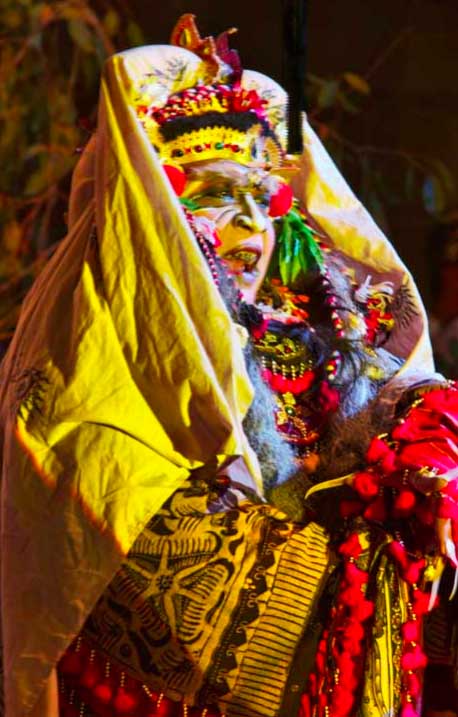Floating Leaf Bali Permaculture Design Course
with Daniel Deighton and Aaron Sorensen
Sunday, January 4th to Saturday, January 17th
This PDC is a 72-hour intensive course for building resilient communities. Permaculture is an ethical based design system that integrates society, culture and ecology. The course empowers people to develop practical design solutions and strategies for urban, suburban, and rural communities and prepares people to work in the world as permaculture practitioners.
Permaculture is unique in that applies to, combines and integrates theory and practice across multiple disciplines. Students develop foundation skills through theory and practice growing understanding and ability to enable good design and ethical decision-making.
The course is founded on learning through doing, with practical hands on experiences weaved into most of the sessions. You will also be exploring existing systems in the urban, rural and the natural environment, learning from what’s already working as well as developing strategies and solutions in response to cultural and ecological challenges.
Elemental Permaculture has more than 20 years of experience in planning, design, implementation, training and education. Our permaculture projects include: urban design, eco village design, regional master planning, school and community gardens and environmental restoration. We are PDC trainers with Brogo Permaculture Gardens and the Permaculture Sydney Institute.
Elemental Permaculture – About our Permaculture Design Course
Why is permaculture important?
Permaculture is coined from the words permanence (forever) and culture (life) – ‘forever life’ – within the context of constant change. Change in our own lives as well as the physical, social, cultural and natural environment we live in.
Permaculture builds our capacity to respond to and adapt to change whilst at the same time considering the needs of all life now and into the future.
Permaculture invites us to imagine ‘the kind of world we want to create, to live in and for future generations to inherit’ – and then empower ourselves, and others, to make it happen.
What we hope participants will take away from the course
On completion of the course you will have a ‘tool kit’ of practical skills & decision making processes to draw upon to design, develop and implement transformative strategies and solutions that respond to the needs of your home and community; your culture and environment.
What we hope to accomplish
To instill the belief, confidence and capacity of individuals and small groups of people to respond appropriately to the challenges and needs of their lives and their communities to effect transformative change.
What participants will experience
On this course you will be learning by doing. Sessions will be guided to ensure competency and comprehension of learning outcomes whilst at the same time draw upon the collective wisdom of the group and highlight the ‘already knowing’ that exists within all people and places.
With you, we will be creating a caring, supportive and cooperative learning environment that encourages participants to SHARE and learn new skills, interests and life experiences.
and learn new skills, interests and life experiences.
Most of all, the course will be fun, and a fantastically interesting, inspiring, and energizing experience.
With a spirit of adventure, cooperation and friendship we invite you to join us on this course and to grow a culture of ‘together we can’ as we face and embrace the collective changes and challenges of our times.
Who is this course for?
Permaculture Design Courses recognize and value the unique role, responsibility and contribution every individual has to make towards creating culture.
Also, that the greater the diversity and variety of skills, interests, perspectives and life experiences the greater the potential for synergy and creativity in the development of solutions and strategies.
Collectively communities can creatively respond and adapt to change. It is with this intention that we have created a course that will support and extend the learning of both those new to or experienced practitioners of permaculture.
What is the cost of the course?
US$2115++ per person based on double occupancy
US$2875++ per person based on single occupancy
US$1875++ per person based on triple occupancy
What is included:
- Deluxe hotel accommodation including 3 healthy organic meals daily
- Welcome drink, refreshing face towel, and welcome foot massage upon arrival
- Use of yoga hall and property grounds per itinerary
- Welcome dinner featuring traditional musicians, gamelon and dancers
- Three rooftop terraces offering dramatic views of the Indian Ocean, Bali’s majestic volcanoes, and the surrounding rice fields.
- Complete expert concierge services
- Daily housekeeping
- Guide fee, gas, tolls, and driver per itinerary
- The Bali Handbook- includes travel tips, checklists, cultural and religious information and much more
- Free High-Speed Wireless Internet
- In-room safe/lock box
All rooms offer…
- En-suite bathroom
- Eco-efficient air-conditioning
- Remote control ceiling fan
- Traditional batik robes and slippers
- In-room safe
- High quality biodegradable organic toiletries
- Private terrace with sweeping views
- Highest standard mattress, pillows, sheets and towels
- Eco-friendly design and materials
- Free Wi-Fi
Additional meals and snacks, specialty coffee drinks, alcohol, fresh fruit and vegetable juices, smoothies and more will also be available for an additional charge.
Not included, but available for purchase at Floating Leaf
- Full spa services including exclusive treatments, massages, Ayurvedic treatments, facial, manicure, pedicure and more. For additional information please see https://balifloatingleaf.com/spa
- Snacks and additional meals
- The coldest and best beer on the island
- Wine and alcohol
- Cappuccino, macchiato, latte and other premium coffee drinks
- Healthy fresh juices, elixirs, smoothies and more.
Cost does not include:
- Travel insurance (highly recommended)
- Airfare
- Visa on arrival (~$35)
- Airport Exit Tax (~$18)
- Shopping expenses
- Mandatory Government taxes and service charge (21%)
Our terms and conditions for participants can be located here…
https://balifloatingleaf.com/bali-terms-conditions
*** To reserve your spot, email us to receive information about deposits and room reservations. ***
Course schedule
| ELEMENTAL PERMACULTURE presents: ~ Permaculture Design Course in Bali ~ January 2015 | |||||
| DATE | Session 1- 9am to 10.30am | Session 2- 11am to 12.30pm | Session 3- 1.30pm to 3.00pm | Session 4- 3.30pm to 5pm | EVENING |
| DAY 1 | Traditional Balinese Welcome Ceremony Introductions House Rules Course Outline | Origins of Permaculture Definitions Why the need? Ethics of Permaculture | Permaculture Principles 1 to 6 (in the field) | Permaculture Principles 7 to 12 (in the field) | Opening dinner & film Global gardener |
| DAY 2 | Ecology Energy Laws Terminology | Climate Global to bioregional | Soils Theory into practice | Soils Theory into practice | Feast & film Soil the film |
| DAY 3 | Water Urban challenges | Water Urban strategies Practical solutions | Trees Theory, practice & strategies on site visits | Trees Theory, practice & strategies on site visits | Feast & film |
| DAY 4 | Earthworks Theory into Practice | Earthworks Theory into Practice | Microclimate (Sketching In the field) | Aquaculture Local practical application | Feast & film Farming with nature |
| DAY 5 | SITE VISITS – The Green School, TBA | ||||
| DAY 6 | Methods of design (A design process) | NIGHT OFF | |||
| DAY 7 | Methods of design (A design process) | Pattern Design exercise | NIGHT OFF | ||
| DAY 8 | DAY OFF | ||||
| DAY 9 | Zone 1: 4 Season Vegetable Gardens Permaculture Practices | Zone 2: Food Forest Permaculture Practices | Feast & Film | ||
| DAY 10 | SITE VISITS – SOCIAL PERMACULTURE Taman Petanu, TBA | ||||
| DAY 11 | Natural building workshop TBA | Planning for Disaster | Appropriate Technology Practical applications | Feast & film Gasland | |
| DAY 12 Design group site visits | Social Permaculture Bioregions Transition Towns | Urban SolutionsCase study: Illawarra NSW Australia | Group Design Session 1 | Group Design Session 2 | Group Design Session 3 Feast |
| DAY 13 | Intentional Communities | Self & the Home Economy | Group Design Session 4 | Group Design Session 5 | PARTY |
| DAY 14 | Where to from here? Global Movement Local Action | Design Presentations | Design Presentations | Certificates & Farewell | |
Who leads the course?
Daniel Deighton –
I was first inspired by the Permaculture movement in 1988 during my undergraduate studies in Landscape Architecture at the University of NSW. On completion, I immersed myself in community lead environment restoration and education. Combining native reforestation and Permaculture food forest principles to reestablish biodiversity, abundance, beauty & amenity to urban environments.
During this time I developed foundation skills and a growing awareness of the importance of community engagement, capacity building & empowerment in the long-term success of a project. This has guided my work as a Permaculture practitioner across a range of roles including: design, planning, project management & implementation; community engagement & development; developing & delivering training and education programs for children, youth and adult groups.
Projects that have engaged, endeared and grown my skills & interests as a Permaculturist over the past two decades include:
‘Tom thumb wetland & GreenHouse Park’ – a community driven restoration of a threatened ecological community and the reforestation of adjoining industrial and urban landfill.
‘Pathways to sustainability’ – A community developed Permaculture food forest in the Steel manufacturing town of Port Kembla
The ‘The Living Classroom & Training Garden Ambassadors Program’ – A cross cultural partnership including corporate, government and community sector that funds a program for primary and secondary school students in hands on learning through Permaculture.
‘Participatory planning and design’ – A process for engaging and facilitating community in decision making for community garden projects
‘Permaculture education and training’ – workshops and full PDC training programs that engage participants in learning through dynamic, practical & creative processes.
‘Multi-disciplinary design’ – collaborating with other professionals to integrate permaculture into eco-village design, urban design, town and regional master-planning
My professional development has been inspired by working and learning with The Port Kembla Community Project Inc., Aaron Sorensen, Robyn Clayfield, John Champagne, Petra Schnieder. I completed a PDC in 1999 with Permaculture Visions and in 2005 was awarded a Diploma in Permaculture.
Aaron Sorensen
Aaron was raised in a small coastal community in a time of environmental and social change. People in the wider bioregion were pioneering a “back to the land movement”, which drew upon the formative principles of Permaculture. This early influence was to beat away and emerge in 1991 whilst studying education at the University of Wollongong where he immersed himself in local bush regeneration projects, seed saving, rental backyard sustainability and farm forestry trials.
He was searching for a suitable pedagogy that could reach to the essence of young people and awaken their spirit to oneness of the earth. Further study in fine arts and travels lead him directly to Mollison’s Designers Manual, which provided the framework for a vision of community resilience. His response was the design, establishment and development of ‘the Garden’ http://thegardennorthgong.blogspot.com.au/with a core group of northern Illawarra change agents in the spring of 1999
The Garden, at the Wollongong PCYC, initially was a place for the rental community to secure space to grow food and animals together and a place of respite from the harsh industrial landscape. It soon evolved into a demonstration hub of shared learning and experimenting in urban Permaculture solutions for community on the edge and/or in transformation. Within 18 months the first of many school visits arrived for a day of Permaculture in action. Although this was extraordinary for group of humble volunteers, Aaron knew for real change to occur in young people, schools would need a designed Permaculture classroom with ongoing training. Along side his work in adult training in the community garden, he honed his engagement skills by weaving community art projects and permaculture practices with ‘Youth At Risk’.
In 2003, Aaron united with Dan Deighton, a talented landscape architect, environmental restorer and community change agent to create the cutting edge ‘Living Classroom and Garden Ambassadors Program’. Piloted at Cringila Public School and growing strong today many teachings came from this journey including the evolution of a model of participatory design, ethical garden building and creative training that could be applied over a range of contexts and audiences.
A few inspiring and powerful mentors continue to shape Aaron’s work they include, Permaculture pioneer, practitioner and educator, John Champagne from Brogo Permaculture Gardens www.permaculturedesign.com.auwhom which he completed his PDC in 2005. Also, the inspiring Permaculture educator Robyn Clayfield of Earthcare Educationwww.dynamicgroups.com.auwhom & Dan both completed the Create Adult Learning facilitation twice!
Elemental Permaculture’s local success has lead him to Indonesia in 2011-12 where he consulted on Permaculture projects with Alam Santi on the Taman Petanu Eco Neighbourhood project Bali www.tamanpetanu.com and master planning on the EcoSolutions Lombok www.alamsantidesign.com
Aaron currently works as a Permaculture designer and trainer in the Illawarra on the innovative ‘Living Classroom’ projects at Warrawong High School, St Patricks Primary School Port Kembla, Cringila, Port Kembla, Nowra East and Coledale Public Schools. He happily co-facilitates on PDCs with Dan for Brogo Permaculture Gardens and Permaculture Sydney Institute and thrives gardening at ‘the Garden’ with other talented green thumbs. http://www.elementalpermaculture.wordpress.com


